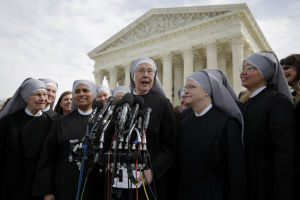1 in 3 Americans Unfamiliar with Darwin's Tie to Evolution
Charles Darwin may be an influential name in the scientific community for the theory of evolution but a new Gallup poll shows that roughly one-third of Americans have no clue who he is or what he's known for.
Ahead of his 200th birthday celebration on Feb. 12, a Gallup poll conducted over the weekend asked Americans the question: "For what scientific theory is Charles Darwin known?"
The Gallup weekly briefing on Tuesday showed that 55 percent of respondents correctly associated Darwin with the theory of evolution, theory of natural selection or his fundamental work Origin of Species. Another 10 percent gave incorrect answers while the other 34 percent said they didn't know who Darwin was or what scientific theory he was known for.
"Whether that's good or bad depends on your perspective," Frank Newport, Editor-in-Chief of The Gallup Poll, told KETV Channel 7 in Omaha.
"I think most of us would assume that even if you disagree with it that a higher percentage of Americans might at least know who Charles Darwin was or at least if he was associated with the theory of evolution."
Darwin, a 19th century British scientist, developed a theory of evolution occurring by the process of natural selection.
During his time, Darwin's theory was controversial because it was perceived as contradicting the biblical teaching on creation. Nearly 150 years since the publication of his Origin of Species, it remains a highly divisive issue among Americans.
The Pew Research Center's Forum on Religion & Public Life recently released a report showing the American public evenly divided on the question of whether or not evolution is the best explanation for life on earth, with 48 percent agreeing that it is and 45 percent rejecting the notion that evolution best explains the origins of human life.
The Pew Forum survey showed that the views on evolution differed widely across Christian communities. Evangelical Protestants were most likely to reject the idea of evolution (70 percent), according to the report originally released in 2008. Meanwhile, historically black Protestants were more likely than mainline Protestants to disagree that evolution best explains the origins of human life, 51 to 42 percent.
Roughly half of Orthodox Christians and Catholics, however, agreed that evolution best explains the development of life on earth.
As the Pew Forum pointed out, the Catholic Church's acceptance of the theory comes with the understanding that natural selection is a God-directed mechanism of biological development and that man's soul is the divine creation of God.
Some mainline churches have taken a similar stance, stating that evolution and creationism do not contradict each other.
While the Evangelical Lutheran Church in America has not issued a definitive statement on evolution, it does contend that "God created the universe and all that is therein, only not necessarily in six 24-hour days, and that God actually may have used evolution in the process of creation," as reported by the Pew Forum.
Another mainline denomination, the Presbyterian Church (U.S.A.) affirms that evolution and the Bible do not contradict each other. But the Presbyterians are cautious and say it "should carefully refrain from either affirming or denying the theory of evolution."
Rejecting the theory of evolution altogether is the Southern Baptist Convention, the largest Protestant denomination in the country. Southern Baptists affirm their belief that creation science can be backed by scientific evidence "without any religious doctrines or concepts."
Evolution in Schools
The controversy surrounding evolution extends beyond church walls to public schools.
In recent years, some states, including Florida, have updated new science standards that mandate a more explicit and in-depth teaching of evolution. The Texas Board of Education, meanwhile, is considering dropping language in the current science curriculum that requires teachers to address "strengths and weaknesses" of scientific theory.
Critics have called such revisions a disservice to academic freedom and critical thinking in the classroom. While supporters of evolution have accused them of attempting to sneak in creationism or intelligent design in the classroom, critics of the new guidelines say evolution is not scientific dogma and that students should be able to explore flaws in the theory.
The Discovery Institute, an intelligent design think tank, for example, has been a vocal advocate of science standards that permit students to hear a balanced presentation on Darwinian theory.
And the majority of the public is on their side, says the Seattle-based organization.
A new nationwide Zogby poll of likely voters, commissioned by the Discovery Institute, indicates overwhelming public support for teaching the scientific evidence for and against Darwin's theory. According to the poll, 80 percent of respondents agree that teachers and students should have the academic freedom to discuss both the strengths and weaknesses of evolution as a scientific theory.
Those who support teaching the "strengths and weaknesses" of evolution are part of a well-informed public and not a "right-wing conspiracy of know-nothings and religious extremists" as the media would suggest, says Discovery Institute's Dr. John West.
Also, Democrats (82 percent) and liberals (86 percent) are even more likely than Republicans (73 percent ) and conservatives (72 percent) to support the position, according to the poll of 1,053 likely voters conducted Jan. 29-Jan. 31.
"That consensus includes Democrats, Republicans, liberals, moderates, independents, and every race, gender, and age group. The Darwin Lobby has isolated itself from public opinion," says West.
The poll also found that support for the position that "Biology teachers should teach Darwin's theory of evolution, but also the scientific evidence against it," jumped to 78 percent, up from 69 percent in 2006.
Meanwhile, the percentage of likely voters who favor teaching only the evidence for evolution fell from 21 percent in 2006 to 14 percent this year. "Clearly, the Darwin-only crowd is losing public support," observes West. "There seems to be a backlash against the strong-arm tactics that have been used in recent years to censor and intimidate scientists, teachers, and students who raise criticisms of Darwin."
Despite the ongoing debate over evolution, Darwin's theory will be a reason for celebration for many this year.
According to a website devoted to celebrations (darwinday.org) there are currently 639 events scheduled in 42 countries for Darwin Day 2009, including a conference hosted by the Vatican in March.



























